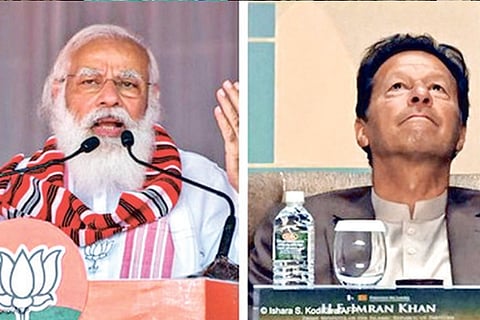

Chennai
It reversed the decision made earlier by Pakistan’s Economic Coordination Committee (ECC) to give the green light for imports from India, which would have ended nearly 20 months of trade suspension between the rivals. The government’s decision came after sharp criticism from opposition parties. They slammed Prime Minister Imran Khan’s administration for not consulting the parliament and trying to mend ties with New Delhi without first resolving the Kashmir dispute. After the reversal, Khan stressed that trade with India would not be normalised until New Delhi resumed Kashmir’s special constitutional status.
Tensions over Kashmir remain
Pakistan halted trade and diplomatic ties with India in 2019 after New Delhi imposed direct rule on the part of Kashmir it administers and imposed strict security controls there in anticipation of unrest at the decision. There has been a frosty standoff since, but signs of rapprochement recently have included Indian Prime Minister Narendra Modi’s exchanging letters with his Pakistani counterpart, Khan, as well as a resumption of talks last week on the use of resources from their shared Indus River. In February, Pakistan and India also agreed to continue a ceasefire at the often-tense Kashmir border.
Anti-India sentiment runs deep in Pakistan, but experts say it does not help the struggling Pakistani economy. “Anti-India sentiments have always been there in Pakistan, and those in power have successfully exploited them for their benefits,” Amit Ranjan, a research fellow at the Institute of South Asian Studies at the National University of Singapore, told DW. He pointed out that New Delhi’s moves affecting Kashmir over the past two years have further strengthened anti-India forces in Pakistan, resulting in a total breakdown in trade and diplomatic ties. “Cutting off such relations has been far from being practical as it puts a tremendous burden on the economically struggling Pakistan. Goods from India are always cheaper than from anywhere else,” he said. Husain, a Pakistani business journalist, told DW that anti-India sentiment is rooted in geopolitics, nothing else. “It grows and diminishes with the requirements of Pakistan’s foreign policy,” Husain said. “It’s also being exploited by the opportunistic Pakistani opposition to try to make Imran Khan look soft on India. Throw in the mix Kashmir, and the government’s options to try to open up a dialogue with India become very limited,” Claude Rakisits, honorary associate professor in the Department of International Relations at the Australian National University, told DW. Pakistan’s economy is currently in the doldrums, a position made worse by a third wave of the coronavirus pandemic, which has seen the reintroduction of partial lockdowns across the country.
The economy of the Muslim nation, with a population of 220 million people, has slid deeper into crisis since Khan took over as PM in 2018. In the 2 1/2 years of Khan’s tenure, GDP growth fell from 5.6% to -0.4%.
The country is in debt to the tune of nearly $114 billion — more than 85% of its gross domestic product. To boost growth and control spiralling inflation, Khan removed his finance minister last week and appointed a new one as part of a government shake-up. Given the fragile economic situation, Pakistan cannot afford hostility with India, experts say. “Even limited trade with India will certainly help Pakistan’s sluggish economy,” Ranjan said. “By resuming economic ties, for instance, Pakistan can benefit from India-produced COVID vaccines, which are relatively cheaper but effective in the fight against the pandemic,” he added.
\This article was provided by Deutsche Welle
Visit news.dtnext.in to explore our interactive epaper!
Download the DT Next app for more exciting features!
Click here for iOS
Click here for Android